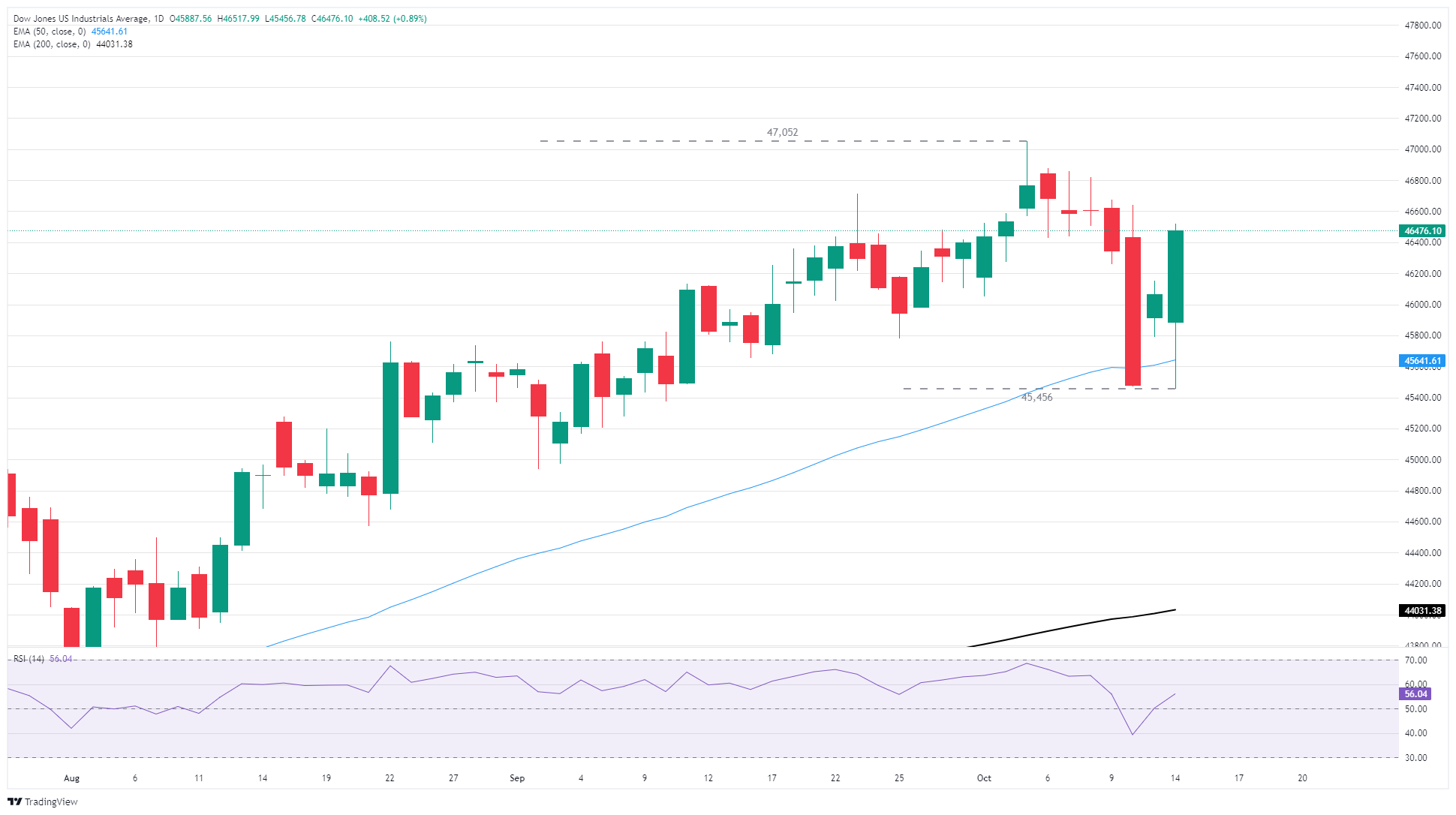Created
: 2025.10.15














![]() 2025.10.15 03:08
2025.10.15 03:08
The Dow Jones Industrial Average (DJIA) gained ground on Tuesday after a tumultuous late start to the new trading week for US equity markets. China imposed strict licensing requirements on any foreign entity trying to export rare earth minerals out of China last week, sparking a fresh trade tariff tirade from US President Donald Trump via social media. China responded by also ramping up port fees for foreign-bound ships in Chinese ports, and investors are once again growing apprehensive of a fresh uptick in global trade tensions at a time when the US is grappling with faltering job numbers.
The Dow Jones fell into the 45,450 region during overnight and early trading hours before investors battled back with fresh optimism, pushing the major equity index back into the 46,500 zone as American markets piled back into the fold following a long weekend hiatus.
The Trump administration has pivoted into something approaching recalcitrance toward the latest Chinese trade controls, threatening an additional 100% tariff on Chinese imports into the US to begin on November 1 if China doesn't reconsider its protectionist trade policies. A Chinese crackdown on rare earths exports directly threatens the stability of several key US industries, including defense, tech, energy, and health services.
Citigroup (C ) and Wells Fargo (WFC) both turned firmly bullish on Tuesday after posting better-than-expected earnings before the market open, and investors will be looking for the rest of the Q3 pack of earnings reports to keep the gravy train running.
Key US data remains limited amongst the ongoing US government shutdown. US Producer Price Index (PPI) inflation numbers, as well as the latest Retail Sales figures, would have been due later this week, but the Bureau of Labor Statistics (BLS) remains unable to release numbers while 750,000 federal workers are facing furlough. Federal departments are coming under increasing pressure as the Trump administration begins a sweeping wave of federal terminations that could reach into the tens of thousands, ensuring that when the US government does return to work, the backlog of unperformed work will be even more difficult to work through.

The Dow Jones Industrial Average, one of the oldest stock market indices in the world, is compiled of the 30 most traded stocks in the US. The index is price-weighted rather than weighted by capitalization. It is calculated by summing the prices of the constituent stocks and dividing them by a factor, currently 0.152. The index was founded by Charles Dow, who also founded the Wall Street Journal. In later years it has been criticized for not being broadly representative enough because it only tracks 30 conglomerates, unlike broader indices such as the S&P 500.
Many different factors drive the Dow Jones Industrial Average (DJIA). The aggregate performance of the component companies revealed in quarterly company earnings reports is the main one. US and global macroeconomic data also contributes as it impacts on investor sentiment. The level of interest rates, set by the Federal Reserve (Fed), also influences the DJIA as it affects the cost of credit, on which many corporations are heavily reliant. Therefore, inflation can be a major driver as well as other metrics which impact the Fed decisions.
Dow Theory is a method for identifying the primary trend of the stock market developed by Charles Dow. A key step is to compare the direction of the Dow Jones Industrial Average (DJIA) and the Dow Jones Transportation Average (DJTA) and only follow trends where both are moving in the same direction. Volume is a confirmatory criteria. The theory uses elements of peak and trough analysis. Dow's theory posits three trend phases: accumulation, when smart money starts buying or selling; public participation, when the wider public joins in; and distribution, when the smart money exits.
There are a number of ways to trade the DJIA. One is to use ETFs which allow investors to trade the DJIA as a single security, rather than having to buy shares in all 30 constituent companies. A leading example is the SPDR Dow Jones Industrial Average ETF (DIA). DJIA futures contracts enable traders to speculate on the future value of the index and Options provide the right, but not the obligation, to buy or sell the index at a predetermined price in the future. Mutual funds enable investors to buy a share of a diversified portfolio of DJIA stocks thus providing exposure to the overall index.
![]()
Created
: 2025.10.15
![]()
Last updated
: 2025.10.15

FXStreet is a forex information website, delivering market analysis and news articles 24/7.
It features a number of articles contributed by well-known analysts, in addition to the ones by its editorial team.
Founded in 2000 by Francesc Riverola, a Spanish economist, it has grown to become a world-renowned information website.
We hope you find this article useful. Any comments or suggestions will be greatly appreciated.
We are also looking for writers with extensive experience in forex and crypto to join us.
please contact us at [email protected].
Disclaimer:
All information and content provided on this website is provided for informational purposes only and is not intended to solicit any investment. Although all efforts are made in order to ensure that the information is correct, no guarantee is provided for the accuracy of any content on this website. Any decision made shall be the responsibility of the investor and Myforex does not take any responsibility whatsoever regarding the use of any information provided herein.
The content provided on this website belongs to Myforex and, where stated, the relevant licensors. All rights are reserved by Myforex and the relevant licensors, and no content of this website, whether in full or in part, shall be copied or displayed elsewhere without the explicit written permission of the relevant copyright holder. If you wish to use any part of the content provided on this website, please ensure that you contact Myforex.
Myforex uses cookies to improve the convenience and functionality of this website. This website may include cookies not only by us but also by third parties (advertisers, log analysts, etc.) for the purpose of tracking the activities of users. Cookie policy